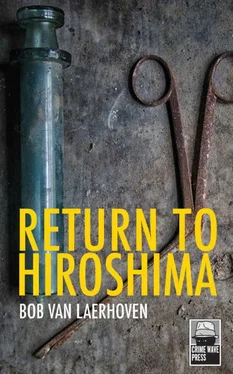I’ve always wondered whether that civil servant – who made sure I could stay here in the home – would ever be proven right. And look, more than twenty-five years later you appear asking about my story, what really happened.”
“We have to dig a little deeper into the past, Mr Masajiro. I’d like to talk to you about South Sumatra, if I may, about what you did in Pangkalan-Balei women’s camp.”
“…”
“Did you understand my question?”
“Yes… but I’m tired… exhausted to be honest. Can you come back tomorrow? I’ll tell you all about it tomorrow.”
Hiroshima – Funairi Hospital – Xavier Douterloigne – morning, March 18 th1995
“How’s the patient today?”
“Better. He was conscious for a few minutes. His pupils reacted to light. He mumbled something, a mixture of his own language and Japanese…”
“Japanese?”
“Apparently he speaks our language. He said something about the kitsune.”
“What?”
“You heard me. The kitsune.”
“If I was a traditional Japanese man, confrere, I would say he was struggling with the fox spirit. And as we all know, the fox represents our conscience.”
“ A classic explanation, my respected colleague. I couldn’t have put it better. The next few hours are crucial.”
* * *
Xavier Douterloigne can hear the murmurs, whispers and sighs of a thousand voices. Guilt, angst and pain are eating him alive. He’s far too young for the tragedy fate has dumped on his shoulders. That awareness is the only thing preventing him from sinking deeper into a darkness that knows no end. He gropes for something solid, something to hold on to, and what does he see? The bronze lights of a tiny temple in a narrow lane in Yanaka, the old part of Tokyo, the oppressive downtown where smells and shadows crowd his twelve year old brain. Slender streets snake upwards on steep hills, littered with tiny ateliers and shops. Xavier follows his father and quickly loses his own sense of direction. His father turns left into an alley that smells of ginger, crosses a tiny courtyard and enters a room on the other side, cool, poorly lit. The yumetoki Xavier is visiting with his father is emaciated, fragile and old; everything one might expect of a spiritual person. The interpreter of dreams pours water in Xavier’s eyes and peers through a hollow bamboo cane at his pupils while his father takes photographs. The ritual was necessary, the clairvoyant explains. It was the only way to see what Xavier’s eyes had seen while he was asleep. The old man peers long and hard and sighs deeply with considerable dramatic effect. He then concludes: “The boy is living in the vicinity of a fox that can transform itself into a girl. We call this spirit the kitsune. ”
Xavier’s father puts down his camera. “Is that good or bad?” Xavier is taken aback at the concern in his father’s voice. It’s all superstition, isn’t it? The old man, his eyes no more than dark pencil marks in his wrinkled face, places his hand on Xavier’s head. “The kitsune is neither good nor bad,” he says. “It depends on the boy himself. If he lives a dutiful life, the kitsune will be good for him. If not…”
Xavier and his father later laughed with gusto at this colourful intermezzo. Xavier squared his shoulders and felt like a man.
But for one reason or another, the memory had resurfaced and in his dream he sees a white fox with red eyes skulking towards him with its head close to the ground. The kitsune gets closer and closer and Xavier is aware that his body is getting tenser by the second. He screams when he recognises the eyes of the fox inches from his face.
His eyes wide open and gasping for breath, he stares into the eyes of a nurse dressed in white, leaning over his bed.
Kyoto – Ryokan Yachiyo – 34 Nanzenji Fukuji-cho – Takeda thinking back to 1973 – morning, March 18 th1995
This is going to be the longest night of my life, Takeda thinks. It’s pouring outside the motel. He’s lying in bed. He shifts his right arm from behind his head and turns. He has pins and needles in his elbow. This night is never going to end, he thinks. Is it because he’s bored? Powerless? He’s definitely uneasy, no question about that, and not only because of the meeting he’s hoping to have the following morning with the Public Security Commission. But for some reason he can’t get the memory of the events that took place twenty years earlier out of his head, and they’re only making things worse.
What now irks him most is the awareness that he always denied the role of fate in what happened to Masajiro Amitani.
Was it an accident , he asks himself so many years later, that his wife told him when he got back from his first meeting with Masajiro that her confused mother, a diabetes patient, had been admitted to hospital after injecting too much insulin and had sunk into a coma. Her doctor had only recently prescribed R-Regular U-500 Humilin, a new concentrated form of insulin, but his mother-in-law had used the same old dose she had been injecting for years. It could easily have been fatal. Takeda and his wife visited her in hospital that same evening. He wasn’t usually so interested in his mother-in-law, but this time he was curious for some reason and asked the old lady what had happened. She had injected twenty units of the new insulin concentrate, and the overdose had almost killed her.
Sitting in his car the following morning in front of the home, Takeda put on his horn-rimmed glasses, cloth cap and civil servant face. Less than ten minutes later he was sitting opposite Masajiro Amitani. This time the man seemed a little uncomfortable.
“Why do you want to know about the camp? They didn’t conduct secret experiments there as they did in Xinjing. It was a camp for women, nothing out of the ordinary.”
“Why were you transferred from the camp to Xinjing?”
Masajiro tried to straighten his back: “The answer to that is simple: my superiors had taken note of my patriotism and my readiness to follow orders to the letter.”
Takeda peered deep into the man’s sunken eyes and asked himself if Masajiro could sense a bond between them. He looked at the soldier’s hands: long fingers with surprisingly coarse knuckles, as if his skeleton had already gone to war with the skin covering it. Takeda noted that the fingers were tense and twisted.
“Your readiness to follow orders to the letter… Tell me, Mr Masajiro, how were the women in the camp treated?”
“According to the regulations of the imperial Japanese army.”
“So the prisoners of war had to be productive.”
The man’s fingers relaxed and he rested his hands on his thighs. “There were production quotas, that’s true.”
“I mean: productive in another way.”
“I’m not following.”
“Did they have to produce babies?”
The fingers tensed. His nails were clean and neatly cut, but his hands appeared to be covered with patches of dirt, or was it subcutaneous bleeding?
“Where did you get such strange ideas?”
“What were the nationalities of the women in the camp?”
“English, America…”
“Dutch?”
“Yes, Dutch too. There were a lot of Dutch people in Sumatra when the war broke out.”
“They have beautiful women in the Netherlands, don’t you think? Tall, sturdy, blonde.”
“They disgusted me. Graceless peasants, smelled of… ”
“Milk and honey?”
“What do you mean by that?”
“Did you enjoy raping them?”
Читать дальше












